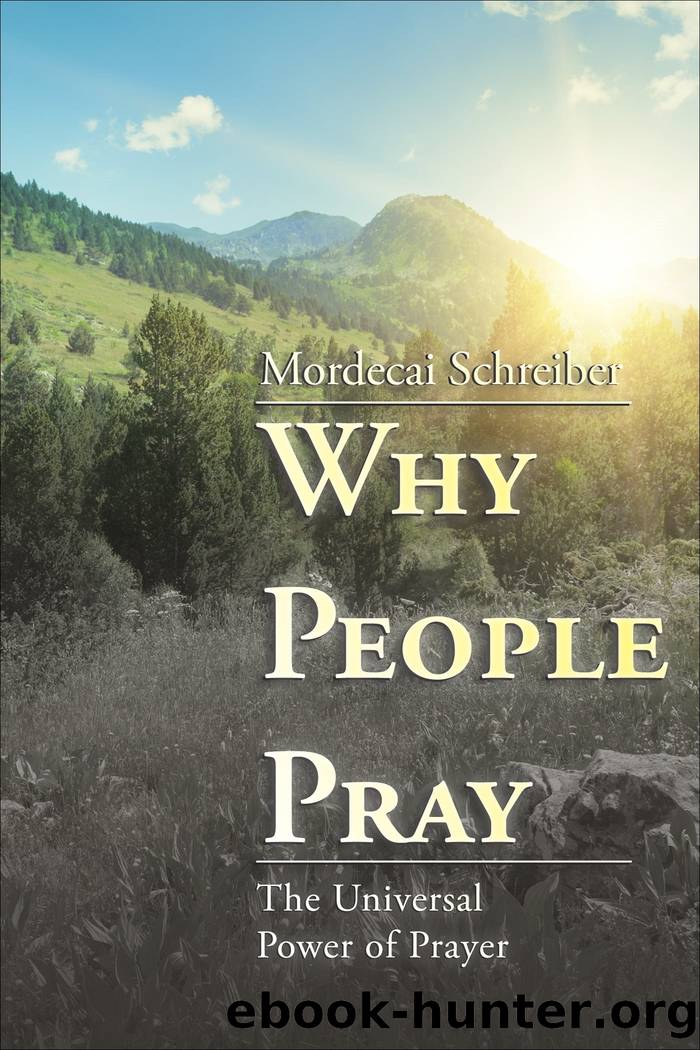Why People Pray by Mordecai Schreiber

Author:Mordecai Schreiber
Language: eng
Format: epub
Publisher: Beaufort Books
Published: 2016-12-15T00:00:00+00:00
PART TWO
WHAT DO PEOPLE PRAY FOR?
21. THE EFFICACY OF PRAYER
There was a time when people put a great stock on prayer. At the dawn of time, according to the biblical narrative, the first two brothers, Cain and Abel, brought offerings to God. We read:
And it came to pass that Cain brought of the fruit of the ground an offering to God. And Abel also brought of the firstlings of his flock and of the fat thereof. And God turned to Abel and to his offering, but to Cain and to his offering He did not turn. And Cain was very angry, and he became morose. And God said to Cain: âWhy are you angry, and why have you become morose? If you do well, shall it not be lifted up, and if you do not well, sin lies at the door; and unto you is its desire, but you may rule over it.â And Cain spoke unto Abel his brother. And it came to pass, when they were in the field, that Cain rose up against Abel his brother, and slew him. (Gen 4:3-8)
The presumption here seems to be that Abel was a righteous person, and so God accepted his offering, while Cain was sinful and therefore his offering was not accepted. And yet the text does not confirm this view, which has to be extrapolated from the next event, namely, Cain committing the first murder in history. Historically, offerings and sacrifices preceded prayer, and were intended to ingratiate oneself with the deity. But the general understanding has always been that one cannot bring an offering and continue to sin and expect to be forgiven. The same applies to prayer. As we have seen in the chapter on repentance, prayer is predicated on turning away from sin and being reconciled with God.
That said, however, there has always been an element of uncertainty in the process of prayer and reconciliation. There is no such thing as guaranteed prayer. If, for example, someone stole a goat and then returned it, and either made an offering for this sin or said the appropriate prayer, it does not follow automatically that forgiveness will be granted. God is not a heavenly accountant who keeps a ledger of sins with credits and debits. The math of heaven is much more complicated. One can only hope for Godâs favorable response, and continue to go about oneâs business hoping for the best.
Perhaps the most puzzling question of all time is why do good people suffer. In the story of Cain and Abel, the latter is taken to be a good person, and yet he dies at his brotherâs hands. Cain is assumed to be a bad person, but this is not confirmed. We are left with a puzzle, which will continue to haunt us every time someone whom we consider to be a good person suffers. And so the element of the unknown is always there in regard to life itself and in regard to prayer.
Organized religion expects its adherents to pray on a regular basis.
Download
This site does not store any files on its server. We only index and link to content provided by other sites. Please contact the content providers to delete copyright contents if any and email us, we'll remove relevant links or contents immediately.
Getting It, Then Getting Along by L. Reynolds Andiric(653)
Religion and Politics Beyond the Culture Wars : New Directions in a Divided America by Darren Dochuk(575)
Global Justice, Christology and Christian Ethics by Lisa Sowle Cahill(428)
Positive Psychology in Christian Perspective: Foundations, Concepts, and Applications by Charles Hackney(353)
Forgiveness and Christian Ethics by Unknown(347)
Douglas Hamp The First Six Days by Unknown(296)
The Horrors and Absurdities of Religion by Arthur Schopenhauer(271)
Insurgency, Counter-insurgency and Policing in Centre-West Mexico, 1926-1929 by Mark Lawrence(266)
Middle Eastern Minorities: The Impact of the Arab Spring by Ibrahim Zabad(249)
Christian Martyrdom and Christian Violence by Matthew D. Lundberg;(242)
The Oxford Handbook of Greek and Roman Mythography by R. Scott Smith;Stephen M. Trzaskoma;(235)
Beyond Heaven and Earth by Gabriel Levy(232)
God and Eros by Patterson Colin;Sweeney Conor;(230)
The Bloomsbury Reader in Christian-Muslim Relations, 600-1500 by David Thomas;(223)
Autobiography, Volume 2: 1937-1960, Exile's Odyssey by Mircea Eliade(215)
Witches: the history of a persecution by Nigel Cawthorne(211)
Cult Trip by Anke Richter(209)
An Introduction to Kierkegaard by Peter Vardy(198)
The Global Repositioning of Japanese Religions by Ugo Dessi(195)
